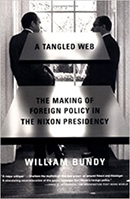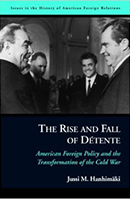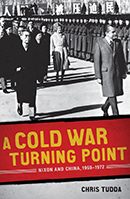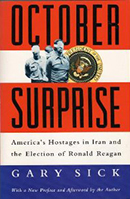Hostages or Pawns?
By Arvind Katta

Gary Sick
Gary Sick is a retired captain in the U.S. Navy who received his B.A. from the University of Kansas, a Master of Science degree at George Washington University, and a PhD in political science at Columbia University. He served as the principal White House aide for Iranian affairs under President Carter.




“This book was never supposed to have been written.”1 In October Surprise: America’s Hostages in Iran and the Election of Reagan, Gary Sick explores the Republican Party’s tremendous cover up to protect themselves against consequences from illegal actions they may have taken during the 1980 election or Iran Hostage Crisis. Allegations against the Republicans were that they made a secret deal with the Iranian government to delay the release of American hostages in Iran. This issue is especially important to Sick as he was the principal White House aide for Iranian affairs during the Carter administration. He was reluctant to believe that the Reagan campaign had made such a deal with the Iranians at first because this fact would undermine all his beliefs about his work during the late 1970s. However, he decided to search for the truth himself because if the allegations were true, “the very legitimacy of the Reagan presidency was put into question.”2
Sick begins by asserting that, although he has not gathered enough evidence for a court case, this book should be a cautionary tale and “argue for a healthy dose of skepticism of those in [government].”3 On November 4, 1979 hundreds of Iranian students took over the U.S. embassy in Iran, taking scores of American diplomats hostage to display anger at America for its prolonged intervention in Iranian affairs. Many Iranians wanted to get rid of Western influence, or gharbzadegi. American media covered the hostage crisis constantly as a major issue to the point where even politically uninterested Americans were enthralled by the sensationalized facts. This reporting also began to hit home through the interviewing of the hostages’ relatives in America. While elections are traditionally centered on more internal issues of the time, the 1980 election was special in that the turning point for either party would be the possibility of an “October Surprise”, a last minute breakthrough in the Iran Hostage Crisis. The Reagan campaign believed they had a chance of winning as long as there wasn’t an October Surprise. An October Surprise would have made Americans forgive Carter and likely reelect him. The first provisions taken by the Reagan campaign to prevent an October Surprise from occurring included the creation of the “October Surprise Committee”, which was essentially the Republican Party’s “hostile intelligence penetration of its own government” to obtain information about the hostages.4 While Reagan was trying to prevent an October Surprise, Iranian revolutionaries were attempting to take advantage of their possession of American Hostages. Khamenei’i was the right hand man of Khomeini, the leader of the Iranian Revolution. Khamenei’i attempted to strike a deal with Colonel Charles Wesley Scott, one of the hostages. In exchange for his freedom, Scott would be required to help provide Iran with arms to fend off the impending Iraqi invasion. Iranian leaders were “growing anxious about the country’s military plight, and at least some were willing to consider unorthodox methods to reestablish the U.S. military supply line.”5 Iran would have had to strike some sort of unfavorable deal with the U.S., but Israel saw Iran’s plight as an opportunity to re-open trade with them. Israel wanted to provide Iran with arms so that it could have the support of a non-Arab country to help protect itself from surrounding hostile Arab countries. Israel also wanted Reagan to win the presidency because of the Republicans’ pro-Israel stance. Iran, Israel, and the Republican Party could all accomplish their goals “only with the collaboration and assistance of the other two.”6 However, Jimmy Carter eventually ordered Israel to stop selling anything to Iran, halting collaboration between Iran, Israel, and the Republicans temporarily. Begin, an Israeli politician integral in relations with Iran and the Republican Party, complied with Carter’s orders but responded, “Jimmy Carter is finished.”7 In 1980, William J. Casey, Reagan’s campaign manager, two other Americans, and some of Khomeini’s officials convened at a secret meeting in Madrid, where they discussed the possibility of delaying the release of the hostages to benefit Reagan, which would in turn benefit Iran because the Reagan administration would provide them with arms. Five different sources confirmed that these secret meetings took place.
After the Shah was overthrown, the revolution was far from over. With the power vacuum created, multiple factions began to vye for power. Ayatollah Khomeini and the Islamic wing distrusted Bani-Sadr, the elected president, and the ruling country was mired with chaos. Meanwhile, the American hostages were still being held in Tehran, and they had become “more of an irritant than an imperative.”8 The hostages were originally taken as a way to rally the Iranian people against the Western-backed Shah and towards the more clerical radical Khomeini. Now, they were still hostages, but Khomeini couldn’t just release them or he would lose the respect of the Iranian people as well as his leverage over the Western world. A series of border conflicts and diplomatic tensions with the neighboring Iraq led many to believe that war was coming. The hostage crisis had denied Iran “both its $12 billion or so in monetary assets frozen in U.S. banks, and the military spare parts that had been trapped in the pipeline when the crisis erupted.”9 To relieve this problem, Iran offered to swap American hostages for military parts and equipment. However, Carter refused to comply–he believed that giving arms to the very people that had kidnapped and abused fellow Americans would be morally reprehensible and would anger the American people. However, without Carter’s knowledge, William J. Casey of the Reagan Campaign secretly spoke to Iran through a West German contact and offered to talk about giving arms to Iran after Reagan’s election, provided that hostages were released after the presidential election in November. In addition to the betrayal by the Republican Party, the British and French secretly offered to sell arms to Iran. Israel even offered to supply weapons to Kurdish rebels in Iraq if Iran changed its policy towards them. This, combined with a surprise invasion by Iraq that deepened the Iranian ruling party’s distrust in the U.S. hampered any serious discussions with the Carter administration and doomed Carter to a no-win situation with many American lives at stake.
With Iraq’s massive invasion of Iran on September 22, 1980, the need for military parts became imperative. Iran decided to reopen negotiations with Carter before the election. From a neutral standpoint, both parties seemed to be in a perfect position to spark a compromise. Khomeini wanted to get rid of the hostages and get military parts for the war. The United States desperately wanted its hostages back and was holding onto millions of dollars of military parts already purchased by the previous Iranian government. As Sick said, the United States would have to give Iran these military parts at one point or another as it would defy international law to deny a country something it had already paid for. However, animosity between both administrations, presence of other options for Iran, and miscommunications prevented a deal from ever being reached. Individual agents tried to remedy this through different methods. Gerhard Ritzel, the West German ambassador, sent a letter to Khomeini appealing to his ego, although not changing any terms of the offer, in an attempt to try to speed up negotiations. Meanwhile, Israel ignored Carter’s direct orders and started dealing with both Iran and the Republican Party in order to strike an arms deal, which undermined Carter yet again. The final nail in the coffin of Carter’s negotiations was a series of meetings in Paris between Israel, Iran, and the Republicans. This meeting was meant to put finishing touches on deals discussed throughout the previous months regarding getting arms to Iran and releasing the American hostages at a suitable time. These meetings were very discreet and held in secret, but Sick relates that there are personal accounts of people who were involved directly or peripherally to corroborate the meetings and their contents. While the meetings were not well-known to the public, the effects of it were seen by the entire world. Soon after the deals were finalized, Khomeini announced that he would not release the hostages until after Carter was out of office. The world mistakenly believed this was because “Khomeini’s unconcealed and unremitting hatred of Jimmy Carter had led him to place his personal feelings above the interests of Iran.” 10 The Republican campaign used this statement as propaganda, promising better results if they were elected. Carter’s campaign had become about the one issue he could not fix.
Sick concludes with Reagan’s unsurprising victory of the presidential election of 1980. There had been a universal understanding amongst all parties that Iran would release the hostages shortly after U.S. elections. However, during the Paris talks, Casey had highlighted the fact that the Reagan administration would be powerless to free up arms shipments in the U.S. until they were in power, leaving Iran to negotiate with the lame-duck Carter administration. Even though Carter had lost the election, he decided to follow his morals and refuse the weapons deal Iran. In the background, Israel was setting up and arms dealing network and getting arms dealers on board along with the Republicans and everything seemed to be working out well for all parties. But then, Iran suddenly decided to demand almost 24 billion dollars from the U.S., much more than the original deal. This put Reagan, who wanted the hostages released before his inauguration, in a difficult situation. In response, he cleverly lambasted the Iranian government to the American people by making “bellicose public statements” and declaring them a “barbaric state”, scaring the Iranian government that he may not fully deliver on his promises.11 Eventually, the Iranian government caved to Carter’s deal, only receiving 4 billion dollars, while hoping to still work on their deal with the Republicans after inauguration. Because Iran complicated the situation, distrust surfaced between Reagan and the Iranian government. The arms deals between the United States and Iran occurred as planned though, using Israel as a middleman to transfer weapons. While Carter had struck a final deal with the Iranians, Khomeini’s animosity towards him caused his staff to delay the release as much as possible so that the hostages could be released immediately after Reagan’s inauguration, further damaging Carter’s reputation.
In writing this book, Sick aimed to reveal that there were many factors in play during the Iran Hostage Crisis that were out of Carter’s control, such as the alliances between Israel, Iran, and the Republican Party, and also the French and British selling arms to Iran. Sick comes to Carter’s defense when he says that the Republican Party’s “political treachery” essentially meant that “the Carter administration’s principled insistence that it would not swap arms for hostages—a decision that required some considerable measure of courage at the time…[was] irrelevant and self-defeating.”12 In selling arms to Iran, the British, as well as the French, “were not loyal to the United States during the hostage crisis,” said a former high official in the Iranian government.13 The U.K. ambassador informed Iran that they were willing to violate the embargo and sell arms to Iran for their own economic gain. One of Sick’s main agendas in this book is to let the public know that even though there is not technically sufficient evidence to prove illegal negotiations between the Reagan administration with all the details, there is no doubt in his mind that William J. Casey convened with Iranian officials at an undocumented meeting to discuss the delayed release of American hostages to use them as pawns in a political game.
Gary Sick’s affiliation with the Carter administration may explain why the majority of this work is dedicated to pushing the blame for the hostage crisis onto the Republicans while indirectly trying to defend Carter’s reputation. While Sick’s affiliation with the Carter administration, coupled with his lack of true hard evidence, may lead readers to question his arguments, it should also be noted that this was not something that Sick wanted to believe. Sick was an integral part of the hostage negotiations in the 1970s, analyzing much of the Iranian government’s actions, and if the allegations were true, “almost everything [he] had lived through had to be considered in a new light.”14 He was, in fact, reluctant to believe the allegations until eventually, enough evidence surfaced and he was unable to deny the truth. Furthermore, this book was written just after the Iran-Contra Affair, so there was a looming feeling of suspicion for the Republican Party.
In an Los Angeles Times review, John Simpson calls Sick’s book “extraordinary” and says that Sick “makes a very clear and cogently argued case for [the allegations]” through his meticulous research process, interviewing all possible sources from all the involved parties.15 Simpson says that this book raises many interesting points and hopes that the book “will lead to a properly constituted inquiry” about the Reagan campaign’s dealings with Iran.16 The book may not have enough evidence to convict any individuals of any crime, but it does raise multiple questions. Simpson mainly considers this work as credible because he believes Sick to be a respectable historian. Joseph E. Persico, in the New York Times, praises Sick as a skilled writer but also says, “his case is ultimately circumstantial and is not conclusive”.17 Persico, while realizing the same fault with the book as Simpson, does not feel that this is enough evidence to even raise a few questions.
While Sick fulfills his goal of bringing the many hidden factors in the Iran Hostage Crisis to light, he also seems to fall into the trap of simply sweeping Carter’s obvious mistakes under the rug and instead focuses on blaming the Reagan administration for the whole hostage crisis. Carter should be held accountable for at least some of this situation because it was his naiveté that allowed the Reagan administration to make such risky deals without anyone knowing. Because Sick worked under the Carter administration, it is understandable that he would have an inclination to defend Carter, which he does by constantly reminding readers that “it was Carter’s campaign that was most vulnerable to events that were now beyond its control”18 Overall, this book does not have enough evidence to convict anyone of anything, and Sick acknowledges this. It does, however, make an argument convincing enough to at least reopen inquiry into what exactly happened from 1979-1980.
Sick makes the point that if one understands what really went on during the Iran Hostage crisis, corruption during the Iran-Contra affair is plausible and even probable. Sick’s book provides a peek into a before unseen cause of the Iran-Contra Affair. While Sick was first interested in investigating this topic for his own personal closure, his findings eventually led to the unearthing of connections that put the international relations in the 1970s and 1980s into a whole new perspective. The Reagan administration’s method of dealing with the Iran-Contra Affair did not make sense to many, as the Reagan administration refused to comply with Iranian demands, seemingly risking the loss of cooperation. However, if one decides to believe the allegations against the Reagan campaign in 1980, then Reagan’s refusal to agree to the Iranian’s terms in the Iran-Contra Affair suddenly makes much more sense. The Reagan administration was confident in forcing the Iranians into his way because “the same parties had cut a deal once before.”19
October Surprise: America’s Hostages in Iran and the Election of Ronald Reagan chronicles the stories of Iranian Revolution, the Iran-Iraq War, and the 1980 American election to explain the hidden story of the Iran Hostage Crisis. Sick sets out to defend Carter and show the public that they need a healthy dose of skepticism when dealing with their government. Any one detail can change the way we view history forever. With this book, Sick shows that if his conclusion is proven true, “the basic history of the period would need to be reexamined and rewwritten.”20
Footnotes:
- Sick, Gary. October Surprise: America’s Hostages in Iran and the Election of Ronald Reagan. London: I.B. Tauris & Co. Ltd, 1991. 3.
- Sick, Gary. 5.
- Sick, Gary. 13.
- Sick, Gary. 28.
- Sick, Gary. 43.
- Sick, Gary. 59.
- Sick, Gary. 72.
- Sick, Gary. 93.
- Sick, Gary. 93.
- Sick, Gary. 157.
- Sick, Gary. 191.
- Sick, Gary. 100.
- Sick, Gary. 108.
- Sick, Gary. 4.
- Simpson, John. “The Pawns of Politics : OCTOBER SURPRISE: America’s Hostages in Iran and the Election of Ronald Reagan, By Gary Sick.” Rev. of October Surprise: America’s Hostages in Iran and the Election of Ronald Reagan. Los Angeles Times 8 Dec. 1991: n. pag. Print.
- Simpson, John. “The Pawns of Politics : OCTOBER SURPRISE: America’s Hostages in Iran and the Election of Ronald Reagan, By Gary Sick.” Rev. of October Surprise: America’s Hostages in Iran and the Election of Ronald Reagan. Los Angeles Times 8 Dec. 1991: n. pag. Print.
- Persico, Joseph E. “The Case for a Conspiracy.” Rev. of October Surprise: America’s Hostages in Iran and the Election of Ronald Reagan. New York Times 22 Dec. 1991: n. pag. Nytimes.com. Web. 31 May 2015.
- Sick, Gary. October Surprise: America’s Hostages in Iran and the Election of Ronald Reagan. London: I.B. Tauris & Co. Ltd, 1991. 173.
- 19. Sick, Gary. 228.
- 20. Sick, Gary. 5.




4 - 4
<
>